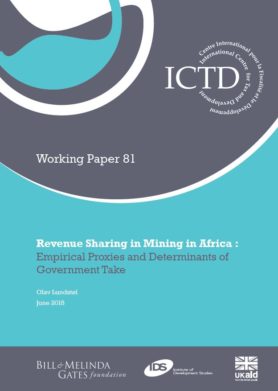ICTD Working Paper 81
Revenues from mining constitute a significant development opportunity, particularly in income-poor but resource-rich countries in Africa. However, there is limited knowledge regarding the extent to which such countries have benefitted from the recent global mineral boom from 2003-2013. This paper finds existing approaches to testing rent theory to be a complicated basis for the assessment of resource revenue sharing between government and companies. Exploring instead a proxy focusing on the ratio of the adjusted mining contribution to government revenues compared to its contribution to gross domestic product, this paper finds levels of mining revenue sharing from 1994-2013 to be well below optimal, although improving in recent years. One exception was Botswana, where ownership interest also constituted an important element, contributing to 58 per cent of total government revenue from mining from 2000-2012. If the other African case countries examined (Ghana, South Africa, Tanzania and Zambia) had achieved the same relative ratio of mining contribution to the revenue and economy, we estimate that government revenue from mining could have been from 2-13 per cent of GDP higher per year on average. The paper finds that the main determinants of revenue sharing were tax, price and production levels, with the cost of investment and operation much less significant.
Read the 2-page brief version here.
